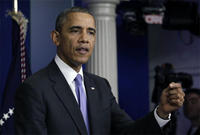-
W.Va. spill leads lawmakers, industry to look at reforming toxic substances law
The government was slow to respond to the 9 January 2014 massive chemical spill in West Virginia because the law governing such response, the 1976 Toxic Substances Control Act (TSCA), limits regulatory agencies’ authority to investigate such spills.Under TSCA, the EPA must first prove that a chemical poses an unreasonable risk to health or the environment before it can require the needed testing that would show a potential risk. One observer called this a Catch-22, telling a congressional panel that “This is like requiring a doctor to prove that a patient has cancer before being able to order a biopsy.”
-
-
Obama uses executive power to changes immigration policy

President Barack Obama is using executive power to tackle the country’s immigration issues while Congress makes little progress on immigration overhaul. The president issued executive orders prohibiting deportations of individuals who arrived in the United States illegally as children, individuals who care for children, and individuals who have no criminal records. Recently, some relatives of military service members living in the country illegally have been allowed to remain in the country as a way to lessen stress on the military and reward veterans.
-
-
Acting DHS IG, under investigation, steps down

Charles K. Edwards, the embattled DHS acting inspector general, yesterday stepped down from his position and took another job in the department. Edwards was under investigation after allegations emerged that he misused his office and softened reports to keep from embarrassing the Obama administration. Late last month, the White House nominated John Roth, a criminal investigator at the Food and Drug Administration, to become the permanent inspector general.
-
-
Lawmaker wants to know how cyber-safe vehicles are
Senator Ed Markey (D-Massachusetts) has asked twenty automobile manufacturers to submit details of their plans to prevent vehicles from wireless hacking attempts, as well as plans to prevent violations of driver privacy. Markey wants automobile manufacturers to apply computer-industry security processes and technology — including anti-virus software, incident logging, incident-response planning, software vulnerability patching, and third-party penetrating testing — to mass produced vehicles.
-
-
Lawmakers: Old plastic gun law has not kept pace with technology
The U.S. House of Representativesvoted last Tuesday to renew the 25-year old Undetectable Firearms Actwhich prohibits firearms that can evade metal detectors and X-ray machines. Law enforcement agencies say that developments in 3D printing make the law insufficient, and lawmakers who proposed amending the Act say that the only way to make such guns detectable is to require that at least one component of the firing mechanism in a plastic gun contain enough metal to be detectable in a magnetometer — and that that component be undetachable. The NRA opposes these requirements, saying that they would infringe on the Second Amendment rights of citizens.
-
-
U.S. defense industry pushes for immigration reform
CEO Linda Hudson of BAE Systemsis making a plea for immigration reform as she links the defense industry’s urgent need for skilled engineers to the push for the United States to develop a simpler path to citizenship for skilled and educated immigrants. She also says that “if we’re forced to forgo international talent we damn well ought to be doing something to produce that talent domestically.”
-
-
Sequestration already eroding U.S. research capabilities
As congressional budget leaders continue negotiations over Fiscal Year 2014 spending levels, three organizations representing the U.S. leading public and private research universities say that the results of a new survey reveal the pernicious impact of sequestration on scientific research across the country. Budget cuts have already led to fewer grants, cancelled projects, staff reductions, and reduced learning opportunities. “If Congress fails to reverse course and doesn’t begin to value investments in research and higher education, then the innovation deficit this country is facing will worsen as our foreign competitors continue to seize on this nation’s shortfall,” the leader of one of the organizations said.
-
-
Lawmakers want better security clearance process
The Senate Homeland Security and Governmental Affairs Committee(HSGAC) held a hearing last week to review security clearance procedures in light of Edward Snowden’s leaks and the Washington Navy Yard assault in which contractor Aaron Alexis shot and killed twelve people. Members of various federal agencies involved in issuing security clearances testified about their initiatives to improve the security clearance process, but legislators pushed for concrete plans and changes to the current system.
-
-
Senate panel’s NSA curbs not enough: critics
Yesterday, the Senate’s intelligence committee approved by an 11-4, and released the text of, a bill which would scale back the NSA’s bulk collection of Americans’ telephone records, increase congressional and judicial oversight of intelligence activities, and create 10-year prison sentences for people who access the classified material without authorization. Critics of U.S. surveillance programs and privacy rights advocates said the bill does little, if anything, to end the daily collection of millions of records that has spurred widespread demands for reform.
-
-
Bill bolsters DHS’s cybersecurity workforce
A House panel recently approved HR 3107, a bill aiming to bolster DHS’s cybersecurity workforce. The House Homeland Security Committeeamended the Homeland Security Cybersecurity Boots-on-the-Ground Actto expand DHS’ outreach to candidates for IT security jobs by creating a tuition-for-work fellowship and a program to recruit military veterans and unemployed IT specialists for DHS employment.
-
-
U.S. tech companies increase lobbying efforts related to surveillance, NSA
Technology firms Apple, Google, Facebook, and Microsoft, among other tech powerhouses, are quietly increasing lobbying efforts directed at government surveillance laws as they seek to have a say in what Congress does regarding surveillance reforms and National Security Agency (NSA) programs. Traditionally, tech firms have not pushed for restrictions on the ability of the U.S. intelligence community to collect data, and it is not clear what position these industry leaders will take, whether they plan to take a position at all, or whether they will present lawmakers with a united industry front.
-
-
Strike Two: The CBP’s failure to polygraph its future employees

Two recent reports – one by the DHS OIG, the other by the GAO — raise an alarm not just about CBP’s failure to monitor and ameliorate the use of excessive force by its agents and officers, but also call into question the quality and character of CBP’s current work force. Rather than reassure the public that the CBP is transitioning into a modern, professional law enforcement agency, these two reports highlight the need for increased congressional oversight and study of an agency which is so vital to our national security.
-
-
Budget impasse halts enforcement of chemical plants safety standards

Security experts say that short of a direct nuclear attack on a U.S. city, the most dangerous, mass-casualty catastrophe the United States faces is a terrorist attack on, or an accident in, a chemical facility which would release toxic clouds over neighboring cities and towns. The federal government partial shutdown is making it impossible to enforce safety and security standards formulated to strengthen the ability of thousands of U.S. chemical facilities to withstand terrorist attacks.
-
-
Bipartisan cybersecurity measure to be introduced in Congress
Senator Saxby Chambliss (R-Georgia) last week said he was “very close” to introducing legislation which would encourage the private sector and government agencies to share information regarding cyberattacks. Chambliss has proposed a government “portal,” operated by DHS, to handle information coming from the private sector. Privacy advocates welcome the proposal for a civilian agency like DHS to operate the information sharing “portal” (in earlier versions of proposed cybersecurity legislation, the NSA was tasked with a similar coordinating responsibility).
-
-
Shutdown paralyzes U.S. food safety regime
Food safety experts this week said that the government shutdown is putting Americans at risk, as the shutdown caused all inspections of domestic food, except meat and poultry, to be halted. The shutdown comes on top of earlier budget cuts to food safety-related agencies, cuts which have already made the food safety inspection regime weaker, so that the shutdown, in the words of one knowledgeable observer, is “creating the potential for a real public health crisis.”
-
- All
- Regional
- Water
- Biometrics
- Borders/Immig
- Business
- Cybersecurity
- Detection
- Disasters
- Government
- Infrastructure
- International
- Public health
- Public Safety
- Communication interoperabillity
- Emergency services
- Emergency medical services
- Fire
- First response
- IEDs
- Law Enforcement
- Law Enforcement Technology
- Military technology
- Nonlethal weapons
- Nuclear weapons
- Personal protection equipment
- Police
- Notification /alert systems
- Situational awareness
- Weapons systems
- Sci-Tech
- Sector Reports
- Surveillance
- Transportation
Advertising & Marketing: advertise@newswirepubs.com
Editorial: editor@newswirepubs.com
General: info@newswirepubs.com
2010-2011 © News Wire Publications, LLC News Wire Publications, LLC
220 Old Country Road | Suite 200 | Mineola | New York | 11501
Permissions and Policies
Editorial: editor@newswirepubs.com
General: info@newswirepubs.com
2010-2011 © News Wire Publications, LLC News Wire Publications, LLC
220 Old Country Road | Suite 200 | Mineola | New York | 11501
Permissions and Policies
